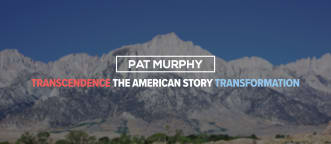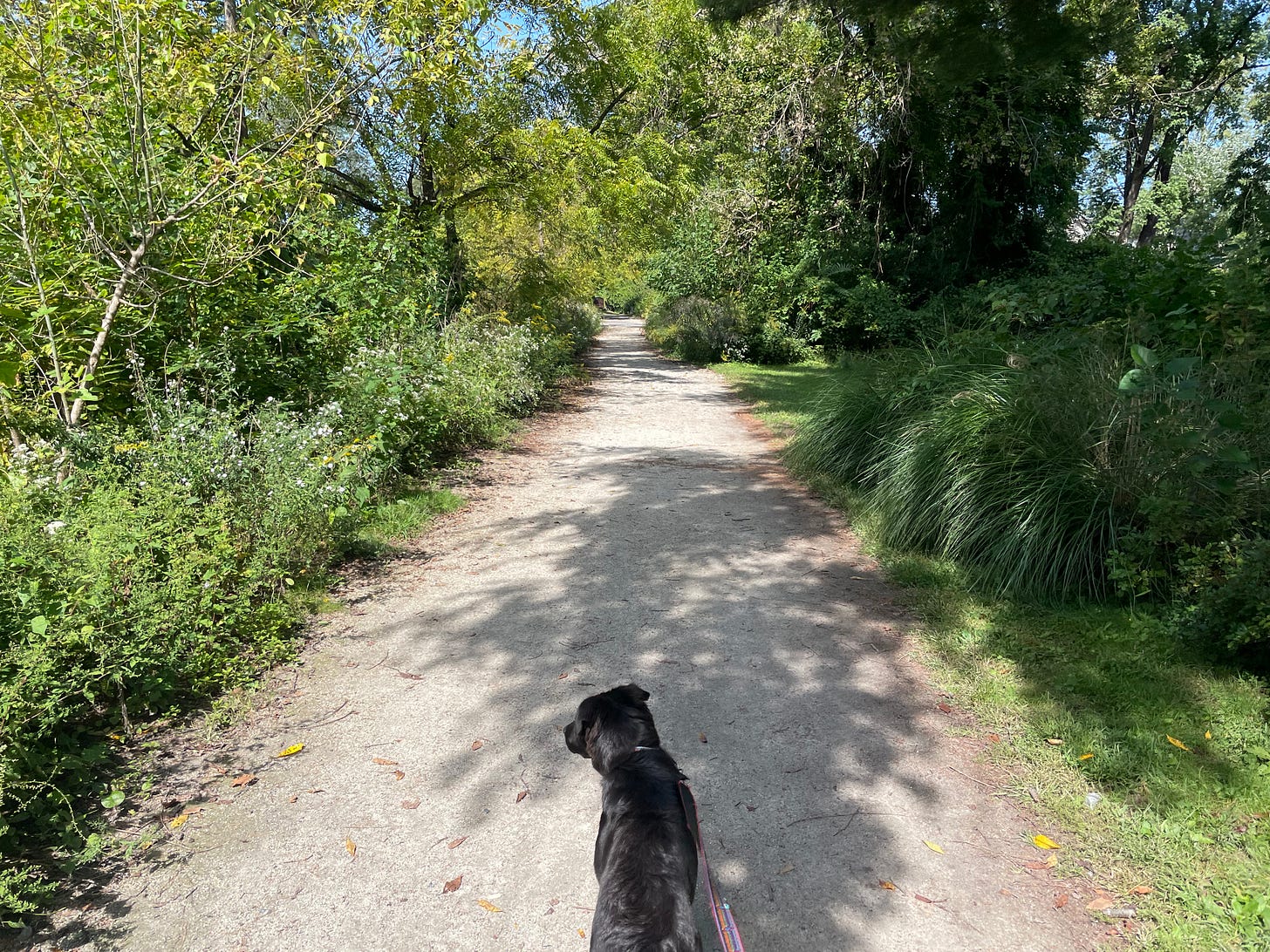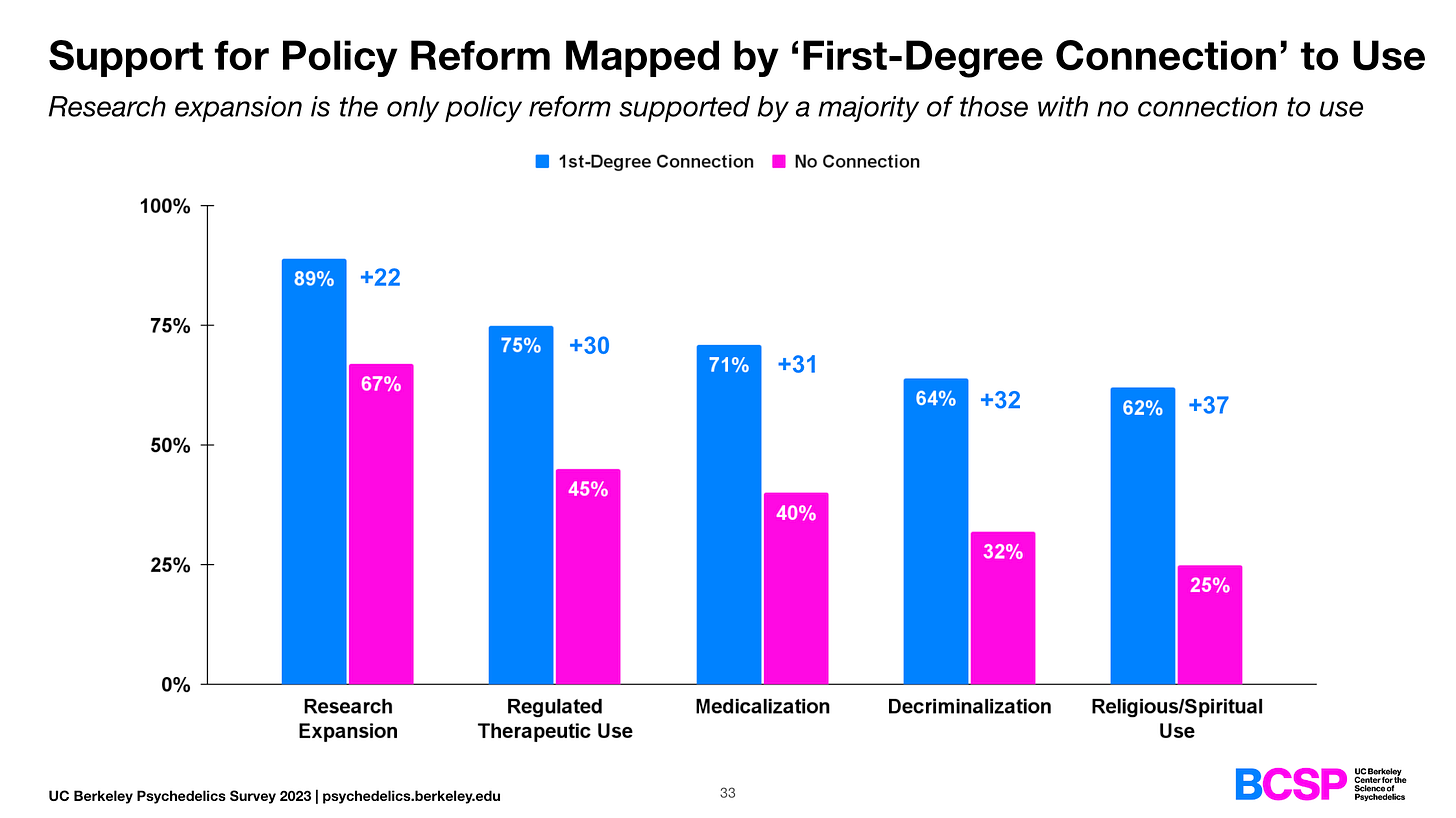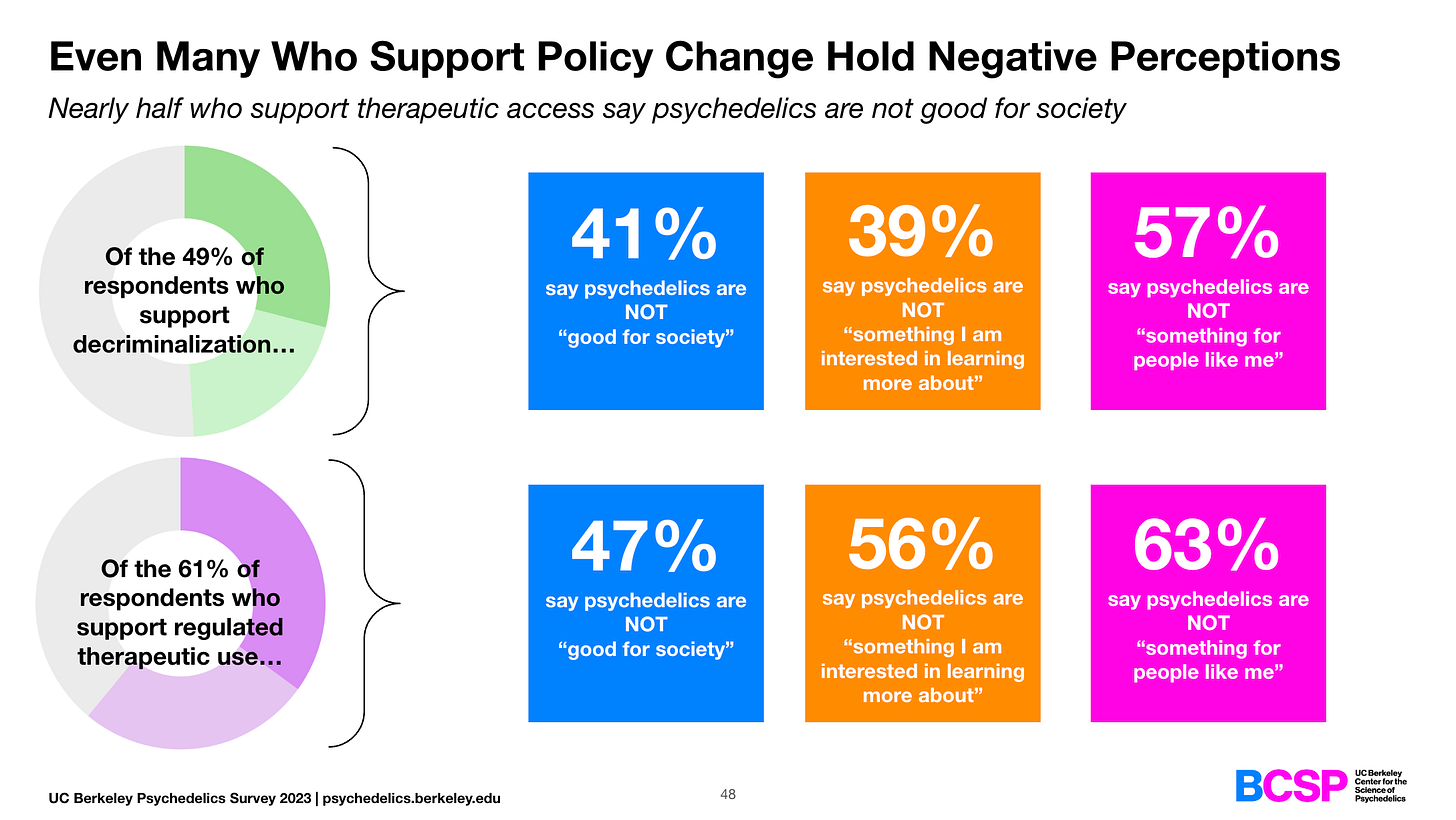Sobering Poll Data on Psychedelics in America
The UC Berkeley Survey That Fell Silent in the Echo Chamber of the Industry
A Personal Update
It’s been one hell of a stifling, muggy summer here on the east coast.
Summer is often a chaotic time for me, and this year I could not be more content with the arrival of fall. The nights are becoming cold, the sky is a clear blue, and there’s a stillness to the air.
It’s like the first moments of an afternoon meditation session. The stresses and the thoughts swirling around my head settle in the presence of the mantra. Things slow down and become a bit clearer.
A large part of my summer neuroticism came from my venture into home ownership. Ram Dass once said, “If you think you are enlightened, try spending a week with your family.” I think we could amend that to “If you think you’re enlightened, try buying a home in America.”
Homeownership is like a religion here. A rite of passage. Something one must do. The indigenous people took peyote or sent the young to spend a few nights alone in the wilderness. In modern America we take a 30-year debt with big banks based on an interest rate set by an irresponsible Fed. And if things continue, this coming of age ritual will be reserved only for the aristocracy.
Ah well. We’ll see if it’s all it’s cracked up to be.
Besides reminding me how far I am from enlightenment, the whole process has also delayed a piece I’ve been meaning to write on fascinating polling data published recently by the UC Berkeley Center for the Science of Psychedelics. One which seemed to land very quietly in the psychedelic space.
Silence in the Echo Chamber
When the UC Berkeley Center for the Science of Psychedelics dropped their survey of American attitudes towards psychedelics in July, it didn’t seem to get too much attention.
Perhaps it’s because I’m no longer very active in the digital psychedelic space. Or it was bad timing after Psychedelic Science, the highly publicized, largest-yet psychedelic conference in Denver. I saw no reason to attend that event, but enjoyed commentary by writers like Jules Evans and Jamie Wheal.
Ed Prideaux is another writer who is on my wavelength. In a chat recently, Ed told me how he finds the rhetoric around psychedelics just plain… boring. I have to say I feel the same way. Even though people have profound, transformative experiences under psychedelics, talking about it all the time can get dull. Irritating even.
But the movement is spreading, that’s for sure. The other day, I got a LinkedIn connection request from somebody whose profile says “Psychedelic Medicine Advocate” and whose banner reads “Psychedelics for Everyone.” After accepting the request, I got a (presumably) automated message about his mission to share the healing power of psychedelics with me.
Are the AI bots pushing psychedelics now? I just can’t help but have a bad feeling about it all.
What makes me uneasy is this emerging “psychedelic evangelism.” I’ve always been wary of religious and political zealots of any persuasion. In this case there’s this vision of a rosy, utopian “psychedelic future.” It’s a future where all people are connected to each other and to the planet. It’s a nice idea that makes you feel warm and fuzzy inside.
But unfortunately it’s just that.
Stanislav Grof said that LSD is a “nonspecific amplifier of the unconscious.” Psychedelics are merely tools. They can be used for good or evil. Throughout history, they’ve been used for all sorts of more sinister purposes: tribal warfare, hunting, remote attacks, and CIA brainwashing.
And yet this psychedelic evangelism gets pushed over and over in online spaces and in-person events like Psychedelic Science. The movement risks becoming an echo chamber, where certain catechisms get repeated and celebrated without scrutiny:
Psychedelics make better people
Mushrooms will change the world
We’re eradicating mental illness
As it turns out, the average American is not exactly on board.
Reality Check on the Psychedelic Utopia
If you checked any of the headlines after the UC Berkeley poll was released in July, you’d think the psychedelic movement was taking over America.
High Times and the San Francisco Chronicle touted the survey’s most encouraging aspect: 61 Percent of Americans Support Legalizing Psychedelic Therapy. To be fair, this is a marvelous achievement and demonstrates how far the culture has come from the peak Drug War of the 1980s & 90s.
But it also shows how journalism has become lazy and superficial. It feels like articles are getting published to push an agenda rather than explore nuance and truth. The coverage looked only at the first few pages of the survey, picked out the rosiest pieces, and moved on.
The analysis left out a lot of details that complicate the psychedelic utopia narrative. These details are important and should be examined if we are serious about re-introducing psychedelics into Western culture.
The survey, which was the first of its kind, featured a diverse pool of people between: male and female, liberal and conservative, religious and non-practicing, and various racial ethnicities.
Some of the more encouraging findings include:
78% support making it easier to research psychedelics
61% support regulated, legal therapeutic access programs for psychedelics
56% say they support obtaining FDA approval for subscription use
What’s notable is that “expanding research into psychedelics” is the only measure that was supported by a majority of participants who have no first-degree connection to psychedelic use.
It’s also worth noting that only 7% “somewhat oppose” and 11% “strongly oppose” making it easier to research psychedelics. More on that later.
This must be the part of the survey where most journalists stopped reading. But if you spend some time going through the rest of it, a more complete and interesting picture begins to emerge.
Stop Saying “Psychedelics Are Going to Change the World”
Although a majority of respondents support legal, therapeutic access to psychedelics, almost half of them also believe psychedelics are NOT good for society.
And 63% say that psychedelics are NOT something for “people like me.”
As the proposals stray further from the use of psychedelics in research, the percentage of those who declare they “strongly oppose” those measures increases.
For instance, only 11% say they “strongly oppose” expanding research, while 31% strongly oppose decriminalization and 34% strongly oppose religious and spiritual use.
Some other key takeaways that complicate the narrative:
When it comes to awareness level of psychedelics, there’s a notable trend towards white, liberal, highly educated people with little to no religious practice
Conservatives, as well as those with a regular religious practice, fall well below average for their overall support
African-Americans hold the lowest levels of support among the demographics surveyed
Return to the Original Path
Decades ago, the OGs of the Renaissance made a calculated decision. They understood that what was tried in the sixties counterculture was never going to work. If psychedelics were going to be introduced to a country in the height of a War on Drugs, it would need to happen from within the establishment.
They understood that if they could show people in a clinical context that psychedelics have the ability to heal those who are suffering, they could loosen the public perception and slowly re-introduce these compounds into the culture.
And it worked.
The only reason there’s a Renaissance is due to this unglamorous work of the past decades. It’s clear from the data that the average American supports this application of psychedelics. Liberal and conservative. Religious and non-practicing.
Once you venture into the territory of the spiritual, or changing society, they are not so sure. And many start feeling strong opposition to those claims.
While the medical model is not without its problems, it seems clear that it’s the most effective way to change the minds of the average person. And it would be smart to stick to that original path, while addressing some of its shortcomings.
As the Psychedelic Renaissance moves further away from the realm of science and more into religious evangelism, it risks losing its credibility. It also becomes more of an echo chamber, and less receptive to challenging ideas.
Evangelists don’t want to hear facts that counter their beliefs. Instead, those beliefs get repeated and reinforced into dogma. I think this is the reason why this survey has received so little attention. Especially the more sobering elements.
I’ve never been interested in speaking to the converted. When I first started making Psychedelia, the whole idea was to introduce psychedelics to the average American. And that’s still my focus today.
When you live in places like Oakland or New York City or Denver, it’s easy to think that the rest of the country is going along at the same pace as your peers. But half the country doesn’t agree with your politics. And it remains a religious and conservative nation in many ways.
If you really believe that “we are all one” and that “psychedelics are for everyone,” then you’re gonna have to learn how to speak to that other side.








Thoughtful and interesting piece, as always.
Hi Pat. I commented on a post of your's many months ago, and here I am again! This piece you wrote about the Berkeley poll results struck so many chords for me. I am a psychedelic therapist on the West Coast of Canada which is now becoming an epi-center for this work and the legal latitude here is beyond anywhere in the world with dispensaries, online, and underground work everywhere. I am a neuroscientist/meditator/clinician and what I have experienced and witnessed working with psychedelics is nothing short of remarkable. I am also painfully aware of the utopian evangelizing and the naive, simplistic thinking that is in this space. Let's face it, these medicines can shift our perceptions of EVERYTHING, and that is kryptonite. I work tirelessly to bring more nuance, complex thinking, safety, compassion, and a more comprehensive conversation to this space as it is so necessary. Let's face it, "mental health" and "mental illness" are now household terms and the traditional medical system has appalling few sustainable treatments for most conditions. Psychedelics are showing to provide a potentially powerful, physiologically very safe, and sustainable alternative to traditional treatments. The questions of dogma, religious beliefs, spirituality, and politics really need to be in perspective in this conversation, as we risk getting mired in unsolvable debates. The day to day reality as I'm witnessing first-hand is that folks are indeed getting massive amounts of help from psychedelic healing/therapy and I continually witness individuals going back to their homes, families, jobs, communities with hearts that are more open, more peaceful and with a more accepting and compassionate view of themselves and the world. Now isn't that the definition of potentially world changing? I mean it has to start somewhere. So to conclude, I deeply appreciate you bringing up the counter-balancing facts in this space. We need them as we need to have the maturity to appreciate all sides of this unfolding. However, I believe that the world needs hope. People need and want hope. Not hype but hope. So let's be wary of too much cynicism and remember that what we focus our attention on is literally what we manifest. I stand firm in my belief that psychedelics are bringing hope to the world, in a beautiful, complicated, fascinating and ever-evolving way. Let's not be too reductive about it all, and be open to exploring what they have to offer!